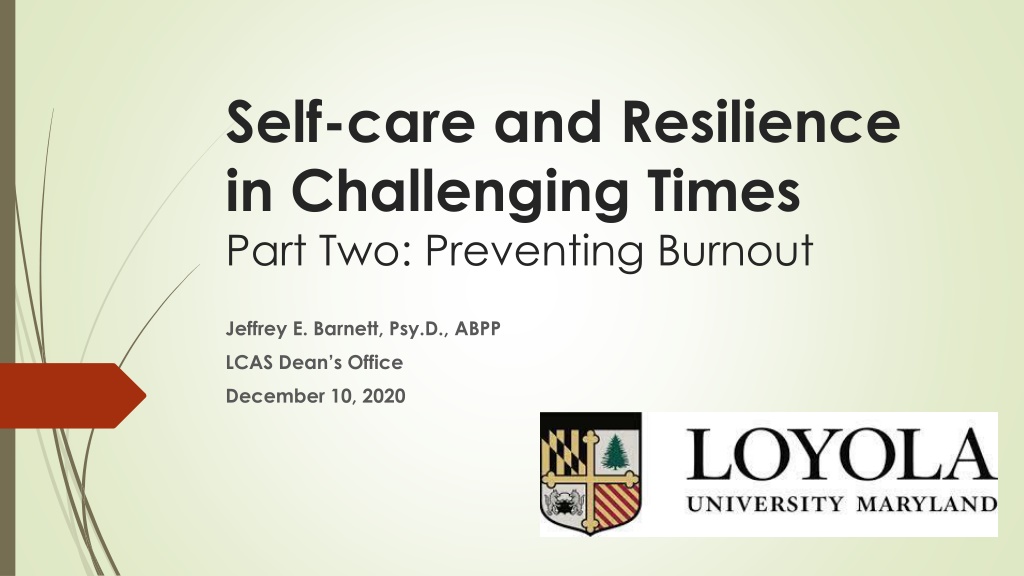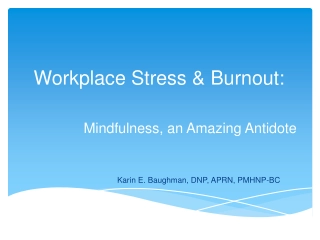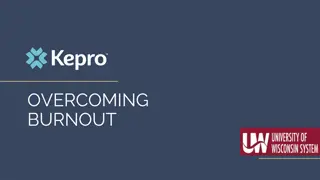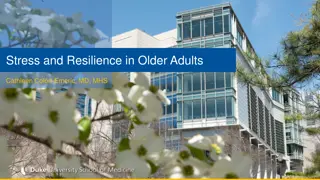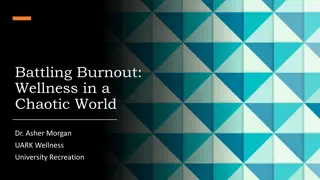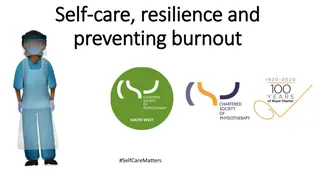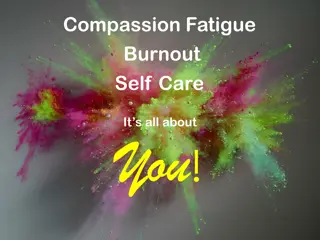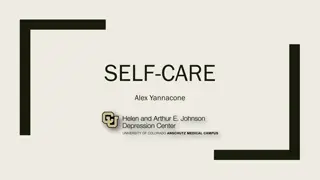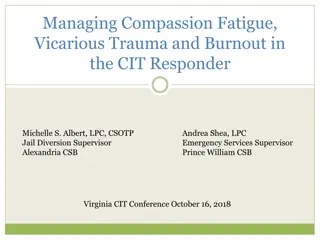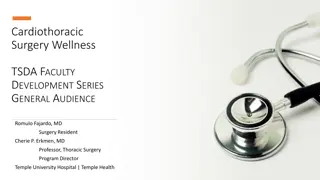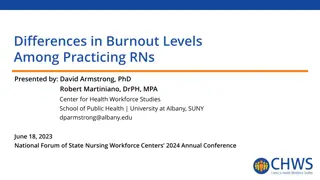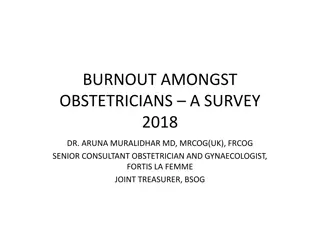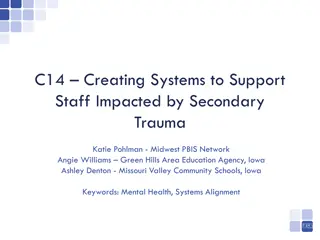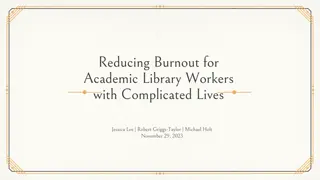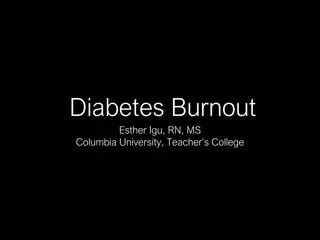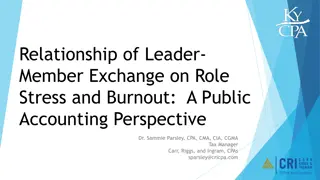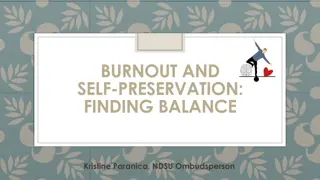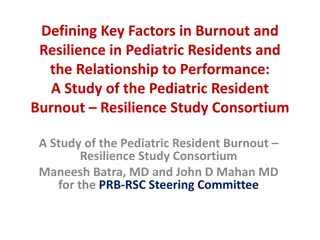Preventing Burnout: Self-Care and Resilience in Challenging Times
Examining burnout, its causes, and warning signs is crucial for maintaining well-being. Freudenberger's definition of burnout, self-assessment tools, and warning signs questionnaire are discussed to help individuals prevent burnout in challenging times.
Download Presentation

Please find below an Image/Link to download the presentation.
The content on the website is provided AS IS for your information and personal use only. It may not be sold, licensed, or shared on other websites without obtaining consent from the author. Download presentation by click this link. If you encounter any issues during the download, it is possible that the publisher has removed the file from their server.
E N D
Presentation Transcript
Self-care and Resilience in Challenging Times Part Two: Preventing Burnout Jeffrey E. Barnett, Psy.D., ABPP LCAS Dean s Office December 10, 2020
Life for you during the pandemic? Your special calm place?
Self-care, Resilience, and our Challenging Times Are You at Risk of Burnout? Review of What Burnout Is and Isn t Feelings of Emotional Exhaustion and Energy Depletion Loss of Caring; Feelings of Negativity or Cynicism Related to One s Job Reduced Professional Efficacy and Loss of Feelings of Accomplishment What Causes Burnout? The Burnout Continuum Myths about burnout
Burnout Freudenberger (1984) described burnout as a depletion or exhaustion of a person s mental and physical resources attributed to his or her prolonged, yet unsuccessful striving toward unrealistic expectations, internally or externally derived (p. 223). Work factors. Personal life factors.
Self-Assessment Ongoing self-awareness, self-monitoring, and self-assessment are essential. There are many self-assessment tools easily accessible on the Internet. One easy to use tool to assess for symptoms of burnout can be found at: https://www.onelegacy.org/docs/BurnoutQuestionnaire_PublicWelfare1981_Modified2013.pdf
Warning Signs Questionnaire for Distress, Burnout, and Impairment (Barnett, 2008) Please check all that apply. __ I have disturbed sleep, eating, or concentration. __ I isolate myself from family, friends, and colleagues. __ I fail to take regularly scheduled breaks. __ I enjoy my work less than in the past. __ I find myself bored, disinterested, or easily irritated by others. __ I have experienced recent life stresses such as illness, personal loss, relationship difficulties, financial problems, or legal trouble. __ I feel emotionally exhausted or drained after meeting with certain individuals.
Warning Signs Questionnaire (cont.) __ I ve become less empathic and caring toward others. __ I find myself thinking of being elsewhere when at work. __ I am self-medicating, overlooking personal needs, and overlooking my health. __ I find my work less rewarding and gratifying than in the past. __ I am feeling depressed, anxious, or agitated frequently. __ I am enjoying life less than in the past. __ I find myself experiencing repeated headaches and other physical complaints.
Checklist for Positive Coping Behaviors Please check all that apply. __ I take regularly scheduled breaks. __ I take vacations periodically and don t bring work with me. __ I have friends, hobbies, and interests unrelated to work. __ I exercise regularly, have a healthy diet, and maintain an appropriate weight. __ I limit my work hours and outside of work work hours. __ I participate in peer support, personal psychotherapy, and journaling as preventive strategies. __ I attend to my religious and spiritual side. __ I regularly participate in relaxing activities (e.g., meditation, yoga, reading, music). __ I regularly participate in activities that I enjoy and look forward to.
Checklist for Negative Coping Behaviors to Avoid __ I self-medicate with alcohol, drugs (including over-the-counter and prescription), and food. __ I deny problems or ignore them. __ I keep taking on more and try to just work my way through things. __ I try to squeeze more into the day, get more done, and measure success by how many tasks I complete and by how much I can accomplish in a day. __ I isolate, avoid colleagues, and minimize the significance of stresses in my life. __ I know that distress and impairment are for others and don t take seriously the warning signs I experience. __ I believe that everything will turn out fine just because I say so.
Barnett and Sarnel (2003) recommend: Make adequate time for yourself. Schedule breaks throughout the day. Do things you enjoy. Engage in hobbies. Take care of yourself physically and spiritually. Take care of the relationships in your life. Say NO! (When appropriate and possible). Don t isolate yourself. Keep in mind that self-care is a good thing. The Lunch Hour Myth Integrate Self-Care into your Daily Life
Focus on prevention. Schedule breaks and mini-breaks throughout each day. Watch out for warning signs in yourself and colleagues. Conduct periodic distress and impairment self- assessments and seek help when it is needed. Make time for self-care. Relax! Don t try to be perfect, to have it all, or to do it all. Know your limits and be realistic. Strive for balance (a moving target and aspirational goal at best) Key Points to Keep in Mind
To Work on Moving Forward Focus on gratitude a few minutes each day. Keep a list that you add to and review regularly. Don t keep it to yourself. Share with others. Connect with what s meaningful in your life. Be of support to those you care about. Be realistic about what you can achieve and what your needs are during this difficult time. Be vulnerable and ask for help. Remember that this is temporary; things will be better in the future.
More to Come Session 3 Why self-care and the promotion of wellness is not an independent activity. How to begin developing your own self-care plan now. Session Creating a culture of self-care. Implementing your self-care plan.
